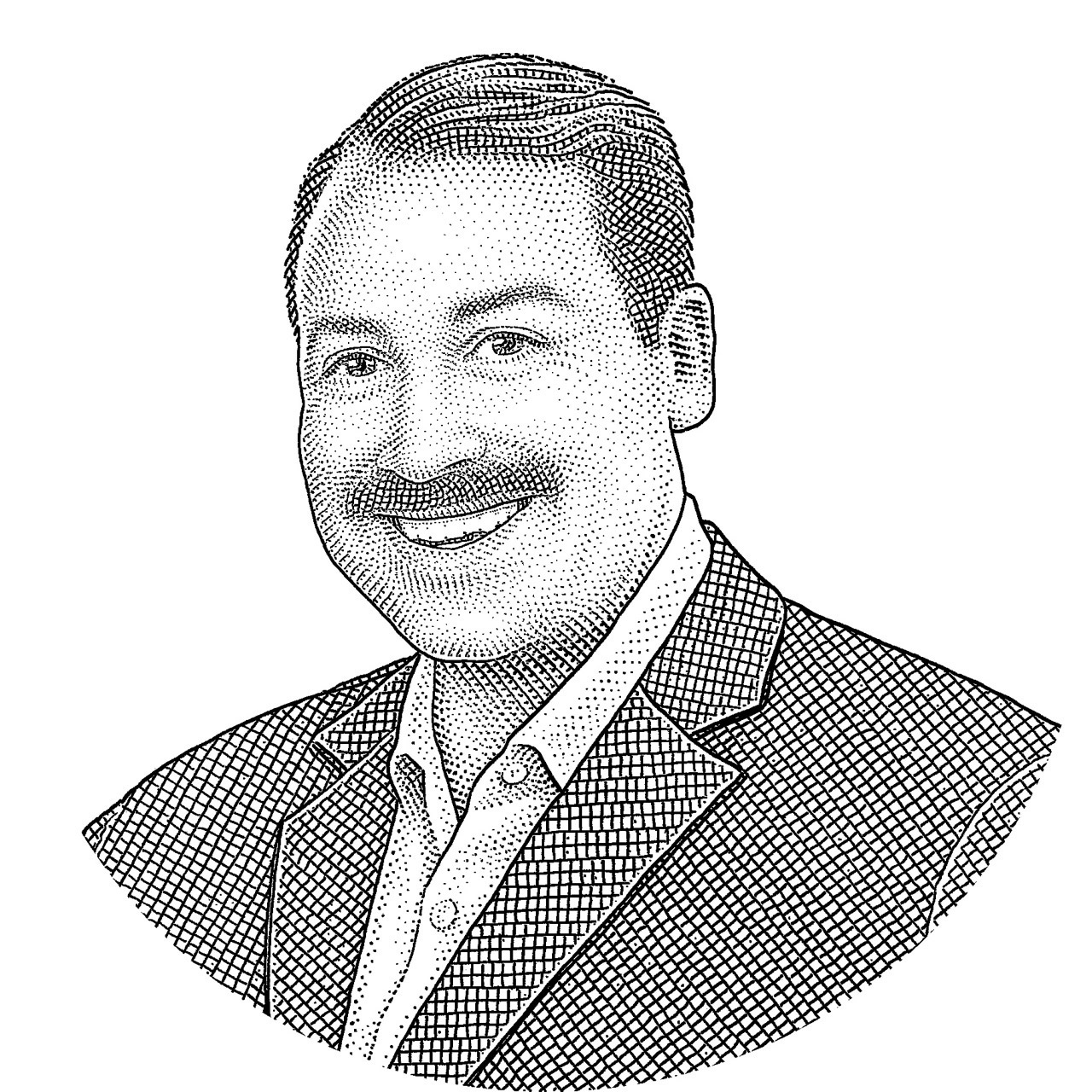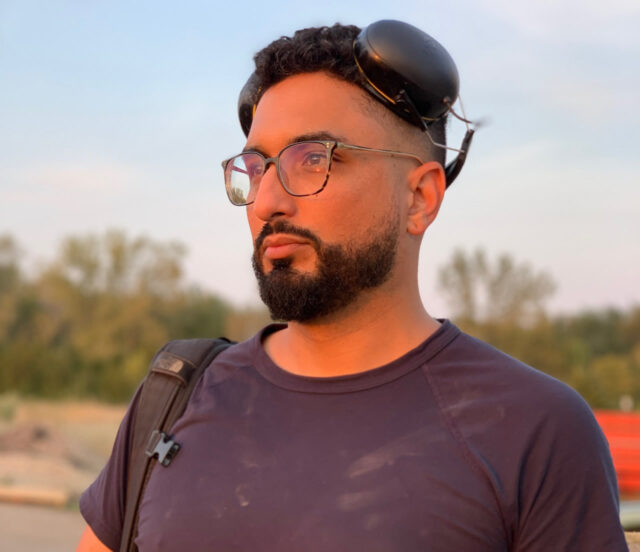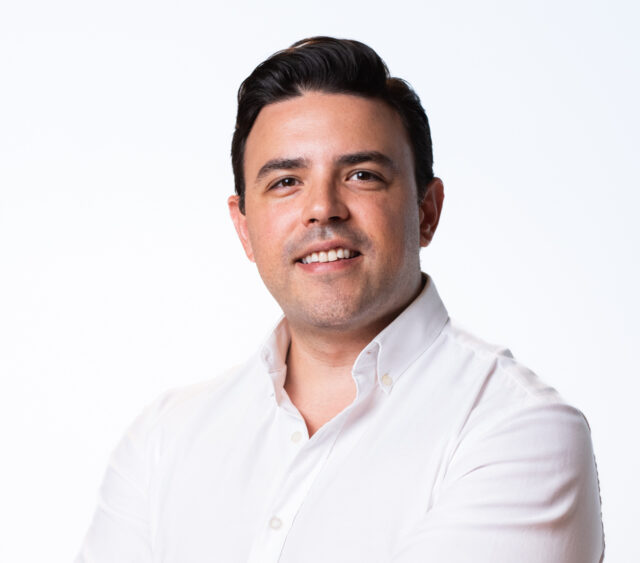Despite political and trade volatility that has been indirectly responsible for propping up and pushing down its overall value, the global cryptocurrency market has in the last few months jumped up and ducked under $3 trillion. In a world where fintech is becoming more widely adopted and seamlessly integrated than ever before, three McIntire alumni are distinguishing themselves at the vanguard of blockchain and crypto innovation. Their ventures, rooted in disparate experiences, reflect an education and professional dedication steeped in cutting-edge tech and solid financial acumen.
We spoke with Daniel Burstyn (McIntire ’10), Edgar Fernandez (McIntire ’07), and John Zettler (McIntire ’11) to learn firsthand from their pioneering work, to explore the challenges they face in their roles, and to understand the potential they see evolving at the frontier of the fintech landscape.
John Zettler: Innovating Retail Staking at Coinbase
 Zettler serves as Group Product Manager of Staking at globally renowned crypto platform Coinbase. His fondness for the company grew from a consumer perspective to a professional endeavor, catalyzed by his startup being backed by Coinbase Ventures.
Zettler serves as Group Product Manager of Staking at globally renowned crypto platform Coinbase. His fondness for the company grew from a consumer perspective to a professional endeavor, catalyzed by his startup being backed by Coinbase Ventures.
“I have admired Coinbase since I found crypto in 2017—first as a customer, then as a developer, and then as a portfolio company when Coinbase Ventures invested in my startup,” he recounts, adding that he was impressed by the intelligence of everyone he met at the company that would later employ him. This appreciation materialized into an opportunity to steer products for staking, a validation process on blockchain networks that allows users to lock their crypto assets in exchange for more crypto to help validate transactions and maintain network security.
“After cofounding our liquid staking token (cbETH) and scoring a big win for the company, I was given the opportunity to lead all of retail staking, a business that today contributes greater than $1 billion in gross annual recurring revenue,” he says.
The product leader, originally from Vienna, VA, says his key responsibilities concern setting his company’s strategy and long-term product vision, representing and prioritizing the needs of the customer, and efficiently managing a diverse team to successfully deliver products to market. At Coinbase, challenges involve striking a balance between strategic foresight and remaining nimble to adapt to fast-paced changes in the industry, developing customer trust with staking, and building cohesive teams.
When asked about his inspiration, Zettler attributes his success to the comprehensive education received at McIntire. “There is no one class or curriculum that a student can take to prepare them to succeed in the crypto industry,” he observes, highlighting the value of cross-disciplinary learning.
As for future prospects, Zettler says the hype around an intersection of artificial intelligence and crypto could redefine how digital currencies operate under AI protocols. “Agents will need a natively digital currency,” he says, suggesting a transformative shift in crypto dynamics, but believes that necessary infrastructure development means that they are still a few years away from adoption.
Daniel Burstyn: Engineering Success with Live Rigs
 For Burstyn, another McIntire trailblazer, the journey into crypto demanded an evolution in both skill and strategy. His candid reflections on initial setbacks reveal that “if you don’t really understand how to develop at all, even conceptually, you’re going to face barriers.” That led him to embrace full-stack development training, teaching himself to code in 2015, which ultimately spawned Live Rigs—a company specializing in mining technologies for which he serves as CEO.
For Burstyn, another McIntire trailblazer, the journey into crypto demanded an evolution in both skill and strategy. His candid reflections on initial setbacks reveal that “if you don’t really understand how to develop at all, even conceptually, you’re going to face barriers.” That led him to embrace full-stack development training, teaching himself to code in 2015, which ultimately spawned Live Rigs—a company specializing in mining technologies for which he serves as CEO.
Burstyn describes discovering the crypto currency Ethereum and its mining capabilities as life-changing. “Because I was in this developer mode when I learned about the idea behind Ethereum, that it was a semi-decentralized world computer, a network with super computing power to build and run decentralized applications, I fell in love with the idea. My favorite movies are ‘Back to the Future 2,’ ‘Terminator 2,’ and ‘The Matrix’ and are arguably prophecies. So it was something I’ve always been looking for.” This epiphany initiated his foray into building computers called GPU rigs, evolving hobbyist passions into a business reality, particularly as demand for decentralized computing power grew.
Amidst market volatility, Burstyn confronted numerous challenges such as sourcing affordable GPUs during scarcity. Yet, he remained unfazed by fluctuations: “It’s an energy arbitrage game,” he says explaining how mining operations could adjust to grid demands and ultimately prove commercially advantageous. His strategic positioning facilitated operations in multiple states, leveraging local energy economies to sustain competitive edge. “Staying ahead of technology is paramount,” he emphasizes.
After time in Dallas overseeing a warehouse filled with GPUs, he sought cheaper power and relocated, building his base outside of Tulsa, OK, where he resides today with his wife and two children, focusing almost exclusively on bitcoin mining and managing fleets of ASICs [custom-made computer chips designed to perform specific tasks]. Burstyn’s entrepreneurial spirit was partly fueled by his McIntire experience, noting how his Commerce education, where he concentrated in Marketing and took a number of finance and entrepreneurship courses, but it was his commitment to entrepreneurship that bolstered his confidence in navigating uncharted territories. “Confidence is everything,” he affirms, underlining the psychological resilience imperative to startup success.
“This space is so Wild West, and so new, so if you can make it this long, it’s because people trust you,” Burstyn says. “In this tiny vacuum world, it’s not sustainable to be a scammer. People are trusting me with tens of thousands of machines—at one point we had $200 million worth of hardware, and we were mining $200,000 worth of coin every day. Integrity is a huge part of what I do, and that’s what Bitcoin is fundamentally about: permissionless systems that need to exist because a lot of people lack integrity.”
He credits UVA and McIntire with giving him immediate credibility as he created connections and made business deals—and he hasn’t forgotten how important honor was on Grounds. He’s taken the commitment with him to support his integrity in this developing, unpredictable industry.
Edgar Fernandez: Merging Family Legacy with Blockchain Development
 In Guanacaste, a northern province of Costa Rica, Fernandez is reinvigorating his family business, Edenia, while exploring unprecedented blockchain potential. He honed his financial expertise at the Comm School, concentrating in Finance and Accounting, and immediately joined the sales and trading team in fixed income and foreign exchange derivatives in emerging markets for seven years at Barclays Capital in New York. Later, Fernandez moved to Bank of America Merrill Lynch, working for four years in its investment banking group.
In Guanacaste, a northern province of Costa Rica, Fernandez is reinvigorating his family business, Edenia, while exploring unprecedented blockchain potential. He honed his financial expertise at the Comm School, concentrating in Finance and Accounting, and immediately joined the sales and trading team in fixed income and foreign exchange derivatives in emerging markets for seven years at Barclays Capital in New York. Later, Fernandez moved to Bank of America Merrill Lynch, working for four years in its investment banking group.
Early on, in 1987, his father had launched an internet startup in Costa Rica. By the 2000s, the company began to focus on internet infrastructure, and by 2014, they were hosting and virtual private infrastructure for clients around the globe.
Those clients needed to pay, and in a pre-PayPal world, that proved difficult.
“We needed to have a payment solution native to the internet. And so my father discovered Bitcoin really as an internet native payment system, not as an investment, not as libertarian money, but really just a solution to a commercial problem,” Fernandez explains.
By 2018, he really saw the boundless transformational potential for cryptocurrency and blockchain technologies and decided to leave Bank of America to work on Edenia with his father and software engineer brother.
“My father saw the beginning of the internet, and he got the same feelings that this is going to change everything,” says Fernandez. The company then pivoted to concentrate on three areas, one of which was blockchain infrastructure. “We started running nodes, basically complete ledgers of transactions on blockchain, a complete copy of a distributed database that’s kept on a computer that we validate when queried. We started doing that and focusing on running blockchain networks through our infrastructure. And then we developed solutions using this technology: smart contracts, pieces of business logic that are saved on top of this distributed decentralized ledger.”
He likens his responsibilities as Partner to those of a CFO in terms of overseeing company finances, billing, and the corporate treasury; setting budgets; and handling banking, accounting, and service provider relationships. His other work falls under business development: creating new relationships and finding new partnerships, exploring new projects for existing clients, meeting client project deadlines, and ensuring their satisfaction in what Edenia is delivering.
Reflecting on the multitude of technological shifts, Fernandez observes, “One of the challenging things is staying focused.” He elaborates on aligning business strategies with emergent technologies, such as real-world asset tokenization, a method democratically reshaping asset ownership.
Fernandez stresses the importance of continuous learning, noting, “Switching from something that was very much numbers-driven to something more creative in software was indeed challenging. It doesn’t have a beginning and an end. The deeper you go, you see that it’s never really done.” His dual acumen in finance and software equips him to bridge traditional and digital finance effectively.
Future Outlook
Burstyn, Fernandez, and Zettler all note that the synergy between technology and finance is predicated on perpetual innovation and adaptation in practice.
Offering advice for those interested in working in fintech, Zettler says, “The best way you can prepare yourself is to balance learning fundamental skills of analysis, reasoning, and communication with a ruthless pursuit of your intellectual passions. And don’t stop when you graduate—it’s a lifelong pursuit.”
Fernandez notes the self-assurance and team building required for anyone who decides to enter the industry in an entrepreneurial venture. “Anybody that’s in a startup will find that rollercoaster, so you need to believe in yourself, stay even-keeled, and surround yourself with people that share the longer view and see the bigger picture.”
Burstyn recounts how he felt a push to follow a trajectory into traditional finance, but says his stubborn nature led him to follow his passion to many less defined, less secure places.
“Don’t be scared of going down rabbit holes,” he advises. “No one knows what’s going to come from all of this, and I would encourage more students to consider this space as the market matures and more financial instruments and products become available and integrated into Bitcoin. Just follow your passion, and don’t be afraid to do something that no one else is really doing. The confidence that comes from your UVA experience is priceless.”



